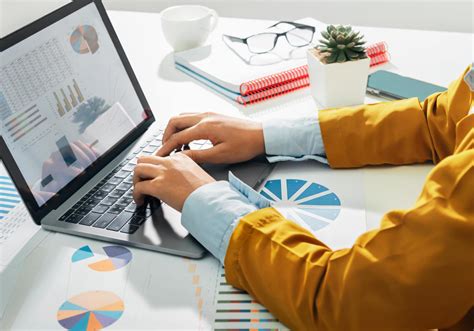Introduction

For professionals in the field of accounting, choosing the right laptop is essential for efficient work and productivity. With the wide variety of laptops available on the market, making an informed decision can be overwhelming. This comprehensive guide will provide you with all the necessary information to find the optimal laptop that meets your accounting needs.
Key Features to Consider
When selecting a laptop for accounting, consider the following key features:
1. Processing Power
- Accounting software requires significant processing power to handle large datasets and complex calculations.
- Opt for laptops with Intel Core i5 or i7 processors or AMD Ryzen 5 or 7 CPUs.
- More cores and higher clock speeds will enhance performance.
2. RAM
- RAM (Random Access Memory) stores frequently used data and programs, enabling faster access and reducing load times.
- Aim for at least 8GB of RAM, preferably 16GB or more for heavy accounting tasks.
3. Storage
- Accounting professionals deal with large amounts of data, including financial records and tax documents.
- Choose laptops with ample storage space, such as a 512GB SSD (Solid State Drive) or a 1TB HDD (Hard Disk Drive).
- SSDs provide faster boot speeds and improved responsiveness.
4. Display
- A clear and comfortable display is crucial for extended use.
- Select laptops with screens of at least 15.6 inches.
- Consider laptops with IPS (In-Plane Switching) panels for wide viewing angles and accurate color reproduction.
5. Battery Life
- For professionals on the go, extended battery life is essential.
- Aim for laptops with battery life of at least 8 hours.
- Look for laptops with energy-efficient features such as Intel Core U-series processors.
6. Keyboard
- Accountants spend long hours typing and inputting data.
- Choose laptops with well-spaced, ergonomic keyboards that provide good tactile feedback.
- Consider laptops with dedicated number pads for quick data entry.
7. Connectivity
- Multiple USB ports, HDMI ports, and Ethernet ports are necessary for connecting peripherals and transferring data.
- Ensure that the laptop has sufficient connectivity options to meet your needs.
Operating System
- Windows and macOS are the two primary operating systems used by accountants.
- Windows laptops offer wide compatibility with accounting software, while macOS laptops provide a user-friendly interface and optimized performance for creative applications.
Recommended Laptop Specifications
Based on the key features discussed above, the following laptop specifications are recommended for accounting professionals:
| Feature | Specification |
|---|---|
| Processor | Intel Core i5 or i7, AMD Ryzen 5 or 7 |
| RAM | 8GB or more, ideally 16GB |
| Storage | 512GB SSD or 1TB HDD |
| Display | 15.6 inches or larger, IPS panel |
| Battery Life | 8 hours or more |
| Keyboard | Well-spaced, ergonomic |
| Connectivity | Multiple USB ports, HDMI port, Ethernet port |
| Operating System | Windows or macOS |
Based on the recommended specifications and user reviews, the following laptops are highly recommended for accounting professionals:
| Model | Price | Features |
|---|---|---|
| Lenovo ThinkPad X1 Carbon | $1,299+ | 14-inch display, Intel Core i5-1135G7, 8GB RAM, 512GB SSD |
| HP EliteBook 840 G8 | $1,099+ | 14-inch display, Intel Core i5-1135G7, 16GB RAM, 512GB SSD |
| Dell XPS 13 | $999+ | 13.4-inch display, Intel Core i5-1135G7, 8GB RAM, 512GB SSD |
| Apple MacBook Air M1 | $999+ | 13.3-inch display, Apple M1 chip, 8GB RAM, 256GB SSD |
| Microsoft Surface Laptop 4 | $999+ | 13.5-inch display, Intel Core i5-1135G7, 8GB RAM, 256GB SSD |
Xero: Xero is a cloud-based accounting software that is popular among small and medium-sized businesses. While Xero is compatible with most laptops, it is recommended to choose laptops with fast processing power and ample RAM for smoother performance.
QuickBooks: QuickBooks is another popular accounting software that offers both desktop and online versions. For the desktop version, laptops with dedicated graphics cards may provide improved performance for visually intensive tasks. For the online version, laptops with reliable internet connectivity are crucial.
Sage 50cloud: Sage 50cloud is designed for small and mid-sized businesses. It requires laptops with sufficient processing power and storage space to handle its large datasets. Additionally, laptops with high-resolution displays are recommended to optimize data visualization.
Choosing the right laptop for accounting requires careful consideration of key features such as processing power, RAM, storage, display, and battery life. By following the recommendations and suggestions provided in this guide, you can find a laptop that meets the demanding requirements of accounting professionals and enhances your productivity.
Frequently Asked Questions (FAQs)
-
Q: Can I use a Chromebook for accounting?
A: Chromebooks are suitable for basic accounting tasks, but they may not be able to handle complex spreadsheets or software. -
Q: Is it better to buy a laptop with a touchscreen or a traditional keyboard?
A: This depends on personal preference. Touchscreens can be convenient for navigating spreadsheets, but traditional keyboards provide better accuracy and precision for data entry. -
Q: How often should I upgrade my laptop for accounting?
A: As technology advances, you may need to upgrade your laptop every 3-5 years to maintain optimal performance and compatibility with the latest software.
